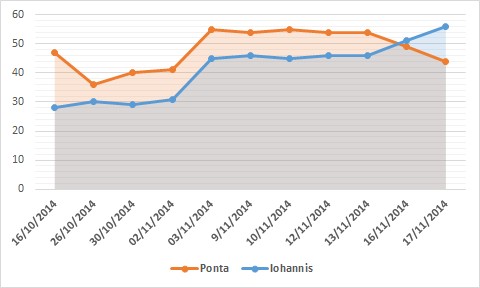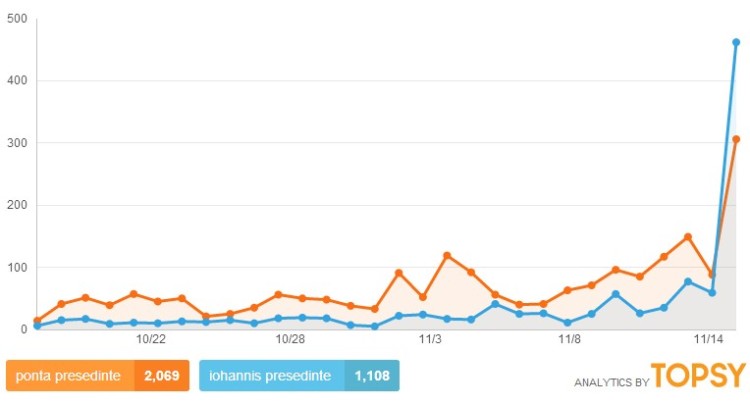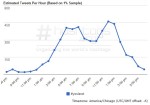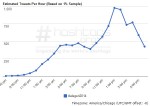A Hungarian version of this post also exists.
The 2014 Romanian presidential elections have been (most certainly) won by Klaus Iohannis. Compared to the other candidate, Victor Ponta, he has been generally regarded as a silent and pragmatic leader. And he didn’t even have a Facebook page until recently. However, when after the first round of the elections it seemed that Ponta will almost certainly win, the Romanian online communities – driven mainly by the social media-aged population and intellectuals in large cities of Transylvania and the capital Bucharest – started a massive pro-Iohannis campaign. I have experienced this first hand, with more than 50% of my Facebook friends being from Romania – every Romanian who opened his Facebook or Twitter in the past two weeks knows what I’m talking about. I believe that this (among a gazillion other things of course 🙂 ), has eventually lead to the victory of Iohannis. Let us look at the social media statistics!

It all started with the not-so-smooth first round of the elections, on November 2. Because of various organizational issues, a large number of expatriate citizens could not vote on their respective embassies. This started outrage in the coming days, with many anti-government protests occurring in the large cities of the country, mainly in Transylvania. Controversies were also reported about the large participation percentage at polls of some southern counties. When the diaspora population – already active on social media out of pure necessity to communicate with their loved ones at home – found solidarity in citizens from home, increasingly worried about a winning Ponta, they started to eagerly share statuses, short messages, articles, hashtags, memes and blog posts and everything else that conveyed a supportive message for Iohannis. The campaign peaked on election day (November 16), with everybody calling on each other to go and vote (#yeslavot, #alegeri2014) and especially on the residents of Székelyland, whom had the lowest participation rates in the first round and the expats living in the diaspora (#diasporavoteaza), considered to be mostly pro-Iohannis. Surprisingly (or not…) the diaspora encountered difficulties again, with lines of 9-10 hours in major European cities being common. This strengthened the online call for vote for all citizens and they showed an unprecedented solidarty and thankfulness towards the diaspora voters (#mulțumimdiaspora). So how could Iohannis win the elections from such a substantial disadvantage after the first round?
As the prime-minister of Romania for the past two and a half years, Ponta has had a Facebook page long before (September 2010) Iohannis (May 2014). Ponta’s followers have been increasing steadily from the beginning (including two potentially suspicious step changes in 2013 and 2014) and in May 2014, when Iohannis started his official Facebook page, Ponta already had around 400,000 followers. Iohannis didn’t have any mentionable amount until a few weeks before the elections (data openly available on Google Wildfire until January 2015).
Let us zoom in to the week just before the second round of the elections:
We can see that while Ponta’s followers has kept their growth rate and followed a linear trend (in fact the growth rate slowed down a bit!), Iohannis’ followers skyrocketed exponentially, gaining more than 200,000 followers on the last day before the elections (November 15). But Facebook popularity alone, cannot be an indicator of a successful social media drive. Let us look at the tweets of the election period. The leading hashtags of the elections in general (without any candidate names) were #yeslavot, #alegeri2014 and #diasporavoteaza, often appearing alongside each other (data openly available on Topsy).

We can celarly see the huge difference between the scales of the first and second round of the elections, with the second round having an echo 3 times larger in the digital space. Zooming in on election day, we can see that #yeslavot and #alegeri2014 are the tone setters (“ies la vot” means “i’m going to vote” in Romanian, while “alegeri” is “elections”), and the #diasporavoteaza only grows towards the evening hours (Romanian time), with a corresponding increase in #alegeri2014. This can be explained as the consequence of the problems encountered with the expat voting sections explained in the beginning – pictures of people waiting in long lines in frustration were now all over Facebook and Twitter – and the constantly updating preliminary results suggesting a potential win for Iohannis (data openly available on hashtags.org).
Clearly, the second round of the elections was a much bigger buzz in the digital world than the first one, but let’s see the share of the support of the candidates! #iohannis had the most mentions on election day, roughly 200 more than #ponta, after a de facto tie the days before. This could trick us into believing that the two candidates had similar support online. While they did have an almost equal amount of voters in reality (look at the tight winning margin), the online picture is far from that. #nuponta (“no ponta” in Romanian) has almost as many mentions as #ponta, indicating that a significant portion of the #ponta hashtags could possibly have a negative connotation attributed to them (data on Topsy).

Looking at the daily graphs, it is clear that there was an early trend in the morning hours with simultaneous mentions of #ponta and #nuponta and a late afternoon trend of #iohannis and #ponta, intensifying roughly at the same time as #diasporavoteaza – indicating that at least a portion of the #ponta mentions here could mean the person not to vote for, mentioned together with the hastag #iohannis, which quickly becomes the most mentioned non-generic hashtag of the day (data on hashtags.org)
Mr. Klaus Iohannis, good job on the elections! And good luck with being the president of the social media generation – it is they who elected you, they want you, inside and outside of the borders. Now you have to live up to their expectations! Let us conclude with the comparison of the search phrases “ponta presedinte” and “iohannis presedinte” (from Topsy), where Iohannis clearly makes a home-run on election day:

Made with Excel, Google Wildfire, Topsy and hashtags.org.









My good man Denes, I couldn’t agree with you more! Your statistics show us how how social media needs to be taken seriously when important problems are pressing bigger masses of people. Even if the Christian Liberals boosted their posts or bought some likes it remains irrelevant because of the increase in activity from actual and living Fb users.I would only emphasize on the fact that social media statistics should be taken seriously BUT only as a sort of mimesis (and a sort of meta-activity of the hive mind) regarding to what’s going on in the actual world we’re living in. This is one of the few exceptions where I am undeniably pro-social media because this time around Facebook provided people an imaginary space where they could deflect their aggression (express it in pics/comments without serious consequences), so the medium projected a space ideal for ideological conflict AND it served it’s purpose as a space for people to expand their circle of empathy.
And I know you stated this as obvious but I think it’s the most important aspect of social media because it sort of reflects reality as a hyperbole. Let’s say one guy says in a comment that “hey PSD activist, I’mma smack you in the face and gouge your eyes out” – well that is highly unlikely to happen in real life but the medium where he expressed this enables his deflection of his own aggression (or empathy in many cases) and relieves a tension in his or her psyche, ending up not hurting somebody else. It’s sort of the same when people start pounding on a table when being pissed off by another person, etc. Same goes for empathy (“I’m friends with 500 people but actually I meet like 20 of them in real life”) and the conscientization of population mass. And if it wasn’t for this medium allowing a virtual and ideological expansion of reality (be it not a 100% factual) there wouldn’t have been a space where people could’ve expressed that they care for each other and the people would’ve been divided.
LikeLike
Very good point! I like how Veritasium explains the concept of bought likes. This campaign was indeed successful because it had actual, and very devoted people behind it.Sort of an extra beauty is, that Mr. Iohannis himself didn’t even have to do much with it probably, it was sort-of community-driven! 🙂
LikeLike
Visit a friendly blog at Hipwerk. It turns out that Iohannis is more famous than Coke or McDonalds!
LikeLike
Thanks! Meanwhile Iohannis cracked 1 million likes, how about that!
LikeLike
Here is how – check fan interactions 🙂
LikeLike
A great, post by Zoltan Sipos, explaining why could the Facebook generation win (in Hungarian).
LikeLike
it was not only transylvania, szekelyland, or bucharest that did something about these elections. the people in the diaspora were not only from transylvania or bucharest, those writing the articles, sharing and liking them were not only from transylvania or bucharest, those that went on the streets in europe and romania and got soaked or attacked by the military police force were not only from transylvania or bucharest. if you want to give credit to someone then it is fair to give credit to all romanians and not just to those that you feel more attracted to or comfortable with.
LikeLike
True! Credit goes to all Romanian netizens!
LikeLiked by 1 person
Check out this article by one of the largest Hungarian portals, referencing this post and clarifying some of the information (in Hungarian).
LikeLike
Just for fun, I also did my own graph for monitoring the facebook likes of the past couple of days. It can be found here: http://tabasco.hofnar.ro/graph.html
LikeLiked by 1 person
A Hungarian version of this post was published on the Transindex news portal from Transylvania.
LikeLike
Excellent analysis on this theme by Romanian blogger Alexandru Negrea, presenting social engagement data.
LikeLike
Reblogged this on My year in Prague and commented:
Romanian elections explained by Data Analysis.
LikeLiked by 1 person
I actually experienced the opposite. I am not saying Iohanis has not had a campaign on Facebook or what not, but on my side, people posted stupid things Ponta has said and done so far. How he admitted to having stolen votes on TV 2 years ago, how he did not understand sarcasm from a person that posted on his facebook page and said “that’s the plan” (in regards to raising taxes and making people work for the politicians mansions and stuff alike), how he uses empty words when asked questions, he says he does not know something when asked in an accusatory tone, which might I add, as a PM, he should. The FACT that he plagiarized his PhD and escaped prison because of his connections and what not. This alone should have made him quit being a Prime Minister.
On the other side Iohanis has been Mayor of Sibiu which was designated a European Capital of Culture for the year 2007. He got elected in 2000, reelected in 2004, 2008 AND 2012.
As a PM, Ponta has not had one good accomplishment. He has been a laughing stock. His administration wanted to win but did not even have a budget plan for the times to come, now… what does that say?
My father is a Vice-Mayor or something like that in his natal village, he has been very invested in making it better, making roads and stuff. He has been an avid supporter of Iohannis and one of the things that have happened with Ponta were: people going from village to village, city to city to vote (they would take a bus of sorts, dad would receive a call along the lines “be careful, this bus has left from my side towards you and they have already voted”), which is illegal. Political “charity” for elderly in order for them to vote for him, stuff like bread and vegetable oil. As people like to say that Iohanis won because of the online media, it is also true that Ponta has had so many votes because of “babe” (old women that don’t know anything, have no TV, were convinced into voting purely because of the “charity”). Not to mention how it has happened for people to be paid to vote for Ponta, how some could not vote because someone already voted in their stead. Once you know all this….. how could u let that grease-ball of a stupid man win a Presidential election?
LikeLike
Thank you London School of Economics for referencing my post!!! http://bit.ly/1AhRr7g
LikeLiked by 1 person